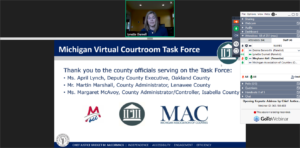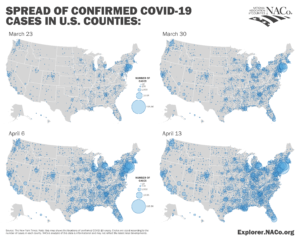Legislative Update 4-17-20
Local governments will make $1.1B ask to governor in letter
 MAC joined with associations for Michigan’s cities, villages and townships today on a letter to Gov. Gretchen Whitmer to advise on distribution of federal aid to local governments dealing with the corona pandemic.
MAC joined with associations for Michigan’s cities, villages and townships today on a letter to Gov. Gretchen Whitmer to advise on distribution of federal aid to local governments dealing with the corona pandemic.
The letter, signed by Executive Director Stephan Currie and his counterparts at the Michigan Municipal League and Michigan Townships Association, said, “Your letter to the White House correctly identifies a major concern that local governments around Michigan are preparing to face. As you are aware, Michigan’s local governments bore the brunt of the last recession and many are ill-positioned to face another economic downturn without significant support from the state and federal government. With that fact in mind, our three organizations respectfully request that you designate a significant portion of the current CARES Act funding the state is set to receive to cover local government reimbursements and recovery expenses resulting from the current pandemic.”
The groups added, “We urge the state to set aside an equitable amount of money for local units of government to draw down upon to reimburse their eligible, COVID-related expenses. Based on the amount the CARES Act made available to our largest members, we ask that an equitable per capita amount, equal to approximately $1.1 billion, be made available to all other local units of government in Michigan to cover these expenses.”
For more information on this issue, contact MAC’s Deena Bosworth at bosworth@micounties.org.
Chief justice opens 2020 Virtual Legislative Conference
 Highlighted by a presentation from Chief Justice Bridget Mary McCormack, MAC’s 2020 Virtual Legislative Conference started its two-week run on Thursday, April 16.
Highlighted by a presentation from Chief Justice Bridget Mary McCormack, MAC’s 2020 Virtual Legislative Conference started its two-week run on Thursday, April 16.
McCormack detailed her work on a variety of reforms in the judicial branch, particularly the actions taken to reduce the threat to jails posed by corona and administrative orders to allow for virtual court proceedings to help protect the public health.
Best practices for boards was the subject of the second event on Thursday, a workshop led by John Amrhein of MSU Extension on “extraordinary governance.”
Following his presentation, Amrhein took up a variety of questions from commissioners looking for tips on how to boost engagement of their county colleagues.
On Friday, Harmony Gmazel of MSU Extension led a workshop on economic development strategies.
“The first wave is complete,” said Stephan Currie, MAC Executive Director. “We had some glitches, but attendance was strong and pre-registrations for next week’s events are looking good, too.”
The conference resumes on Tuesday, April 21 with a workshop on addressing rising waters in Michigan.
For complete details, including videos of conference events, visit the conference page.
Governor, Senate Republicans offer thoughts on reopening economy
 While COVID-19 will be with us for months to come, Michigan leaders have been planning for how to bring more businesses and workers back online.
While COVID-19 will be with us for months to come, Michigan leaders have been planning for how to bring more businesses and workers back online.
This week, Gov. Gretchen Whitmer joined with other governors in region to outline some metrics for easing the current restrictions. They are:
- Sustained control of the rate of new infections and hospitalizations.
- Enhanced ability to test and trace.
- Sufficient health care capacity to handle resurgence.
- And best practices for social distancing in the workplace.
The governor also said on Friday that she’s hopeful to begin easing restrictions on May 1.
Republicans in the Michigan Senate unveiled their own proposal on Thursday to reduce restrictions. And the Trump administration has issued guidance meant for states to consider as this work progresses.
Michigan’s stay-at-home order is in place until April 30, which puts it in a group of 16 states with that date. Another 22 states have orders going past May 1 (New York and Wisconsin extended this week).
Chief justice urges counties to seek federal aid
 Supreme Court Chief Justice Bridget Mary McCormack urged state and local governments on April 16 to apply for more than $24 million in Coronavirus Emergency Supplemental Funding (CESF) made available through the US. Department of Justice’s Bureaus of Justice Assistance. The chief justice also noted this during her discussion with MAC at our opening session of the 2020 Virtual Legislative Conference.
Supreme Court Chief Justice Bridget Mary McCormack urged state and local governments on April 16 to apply for more than $24 million in Coronavirus Emergency Supplemental Funding (CESF) made available through the US. Department of Justice’s Bureaus of Justice Assistance. The chief justice also noted this during her discussion with MAC at our opening session of the 2020 Virtual Legislative Conference.
MAC shared information last week with members about the available funding and encourages those that have not already applied to do so as soon as possible. The official deadline is May 29.
Per BJA guidance, “Funds awarded under the CESF Program must be utilized to prevent, prepare for, and respond to the coronavirus. Allowable projects and purchases include, but are not limited to, overtime, equipment (including law enforcement and medical personal protective equipment), hiring, supplies (such as gloves, masks, sanitizer), training, travel expenses (particularly related to the distribution of resources to the most impacted areas), and addressing the medical needs of inmates in state, local, and tribal prisons, jails, and detention centers.
“Funds may not be used to supplant state or local funds but must be used to increase the amounts of such funds that would, in the absence of federal funds, be made available. Funds may not be used for direct administrative costs that exceed 10 percent of the total award amount.”
For any localities that need assistance drawing down funds, the BJA offers a support hotline: 888-549-9901 or GMS.HelpDesk@usdoj.gov. Find the application here.
This list of expected eligible entities in Michigan was made available by the BJA last week. If your county was not specifically identified, MAC suggests using the hotline to ask about qualifying.
 May 5 summit will focus on opioid treatments
May 5 summit will focus on opioid treatments
Please join the Center for Behavioral Health and Justice for our Opioid Treatment Ecosystem Community of Practice Virtual Summit on Tuesday, May 5 from 9 a.m. to 11 a.m.
Hear from communities across the state who are implementing processes to provide medications for opioid use disorder within their county jails and leading community-based initiatives to expand the broader treatment ecosystem. An in-person event is being planned for this fall.
 On Tuesday night, Gov. Gretchen Whitmer issued Executive Order 49 to “to provide limited and temporary relief from certain regulatory requirements to enhance the operational capacity and efficiency of health care facilities.”
On Tuesday night, Gov. Gretchen Whitmer issued Executive Order 49 to “to provide limited and temporary relief from certain regulatory requirements to enhance the operational capacity and efficiency of health care facilities.”
The order states, “The Michigan Department of Health and Human Services will work with long-term care facilities across the state to establish COVID-19 designated regional hubs. These hubs will provide higher levels of care and services to treat patients with increased needs. All other nursing facilities will continue providing care in a traditional manner which may include the care of patients who have been diagnosed with COVID-19, but do not require specialized care and services.”
Michigan counties are a key provider of long-term care services via the 34 county-owned facilities that are members of the Michigan County Medical Care Facilities Council. Those facilities operate more than 4,600 beds in locations from Houghton to Hillsdale counties.
 Staff picks
Staff picks
- MAC talks to Bridge Magazine about fiscal stress under COVID
- OR nurse demonstrates the need for diligent handwashing (Facebook)
- Best case scenario for coronavirus (New York Magazine)
- 9 ways to stay positive during pandemic (Forbes)
NACo maps spread of COVID across nation
 Using its County Explorer platform, the National Association of Counties has created numerous maps and charts to show the spread of the coronavirus. Among them:
Using its County Explorer platform, the National Association of Counties has created numerous maps and charts to show the spread of the coronavirus. Among them:
- States with the highest number of COVID-19 cases per 100,000 residents
- COVID-19 cases
- COVID-19 cases mosaic
- County tax revenue
- 10 counties with most COVID-19 cases
- Small counties with the highest number of COVID-19 cases
- Counties with the highest number of COVID-19 cases and their one week case increases







